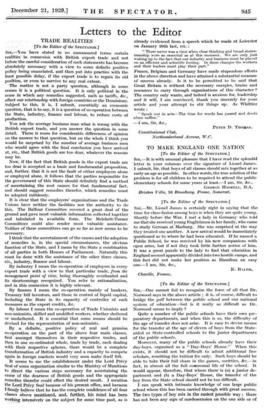Letters to the Editor
TRADE REALITIES [To the Editor of the SPECTATOR.]
Snt,—Sfou have stated in no unmeasured terms certain realities in connexion with British export trade and not before`the careful consideration of such statements has become absolutely necessary with a view to some definite positive policy being enunciated, and then put into practice with the least possible delay, if the export trade is to regain its old position, or even to survive to any real extent.
The matter is not a party question, although in some senses it is a political question: It is only political in 'the
sense in which any remedies suggested, such as tariffs, &c., affect our relationship with foreign countries or the Dominions. Subject to this, it is, I submit, essentially an economic question, that is to say, it is a question of co-operation between the State, industry, finance and labour, to reduce costs of production.
You ask the average business man what is wrong with the British export trade, and you answer the question in some detail. There is room for considerable differences of opinion on the answer to that question, but on the whole I think you would be surprised by the number of average business men
who would agree with the final conclusion you have arrived at, viz., that British goods are too dear, whatever the reasons may be.
Now, if the fact that British goods in the export trade are too dear is accepted as a basic and fundamental proposition, and, further, that it is not the fault of either employers alone or employed alone, it follows that the parties responsible for the government of this State should definitely find a method of ascertaining the root causes for that fundamental fact, and should suggest remedies therefor, which remedies must be adopted ruthlessly.
It is clear that the employers' organizations and the Trade Unions have neither the facilities nor the authority to do this. The Balfour Committee covered a great deal of the ground and gave most valuable information collected together and tabulated in available form. The Melchett-Turner Committees could also render most valuable assistance. Neither of these committees can go so far as now seems to be necessary,.
I think that the ascertainment of the causes and the adoption of remedies is, in the special circumstances, the obvious function of the State, and I mean by the State a combination of all parties in both Houses of Parliament. Naturally this must be done with the assistance of the other three classes, viz., industry, finance and labour.
By industry I mean the co-operation of employers in every export trade with a view to that particular trade, from the management point of view, being thoroughly overhauled and its shortcomings recognized. You refer to rationalization, and in this connexion it is highly relevant.
By finance I mean the co-operation mainly of bankers, Treasury bill investors, and those in control of liquid capital, including the State in its capacity of controller of such measures as the export credits, &c.
By labour I mean the co-operation of Trade Unionists and non-unionists, skilled and unskilled workers, whether sheltered or unsheltered. It is essential that some means should be devised for the representation of non-unionists. By a definite, positive policy of real and genuine co-operation on the part of the above four main classes, first amongst themselves in their respective trades, and then in one co-ordinated whole, trade by trade, each dealing
with their respective spheres, there would be a complete transformation of British industry and a capacity to compete again in foreign. markets would very soon make itself felt.
It seems to, me the _establishment under the Lord Privy Seal of some organization similar to the Ministry of Munitions to direct the various steps necessary for ascertaining the cause of the dearness of British goods and the appropriate remedies therefor could effect the desired result. I mention.
the Lord Privy Seal because of his present office, and because I ffrfply believe that he has the complete confidence of all four classes above mentioned, and, further, his mind has been
working intensively pn the subject for some time past, as is • already evidenced from a speech which he made at Leicestet on January 20th last, via. :
• " There never was a time when clear thinking and broad states- manship were so essential as at this moment. We are only just waking up to the fact that our industry and business must be placed on an efficient and scientific footing. In these changes the workers and their leaders must play their part."
Prance, Belgium and Germany have made stupendous efforts in the above direction and have attained a substantial measure of success already. Is it to be permitted to be said that Great Britain is without the necessary energies, brains and resources to carry through organizations of this Character ? The country only wants, and indeed is anxious for, leadership and it will, I atn convinced, thank' you sincerely for your article and your attempt to stir things up. As Whittier wrote :
" Speak out in acts--The' time for words has passed and deeds alone suffice."
—I am, Sir, &c., Constitutional Club, Northumberland Avenue, W.C. PETER D. THOMAS.


































 Previous page
Previous page